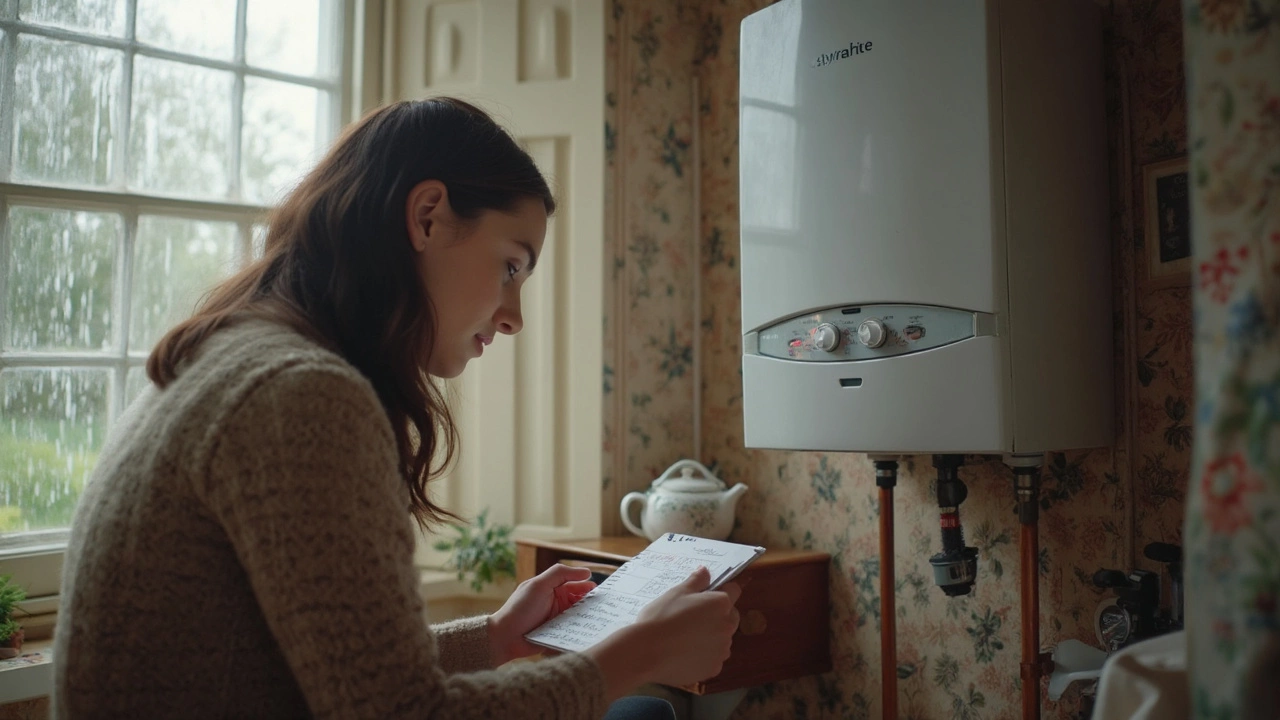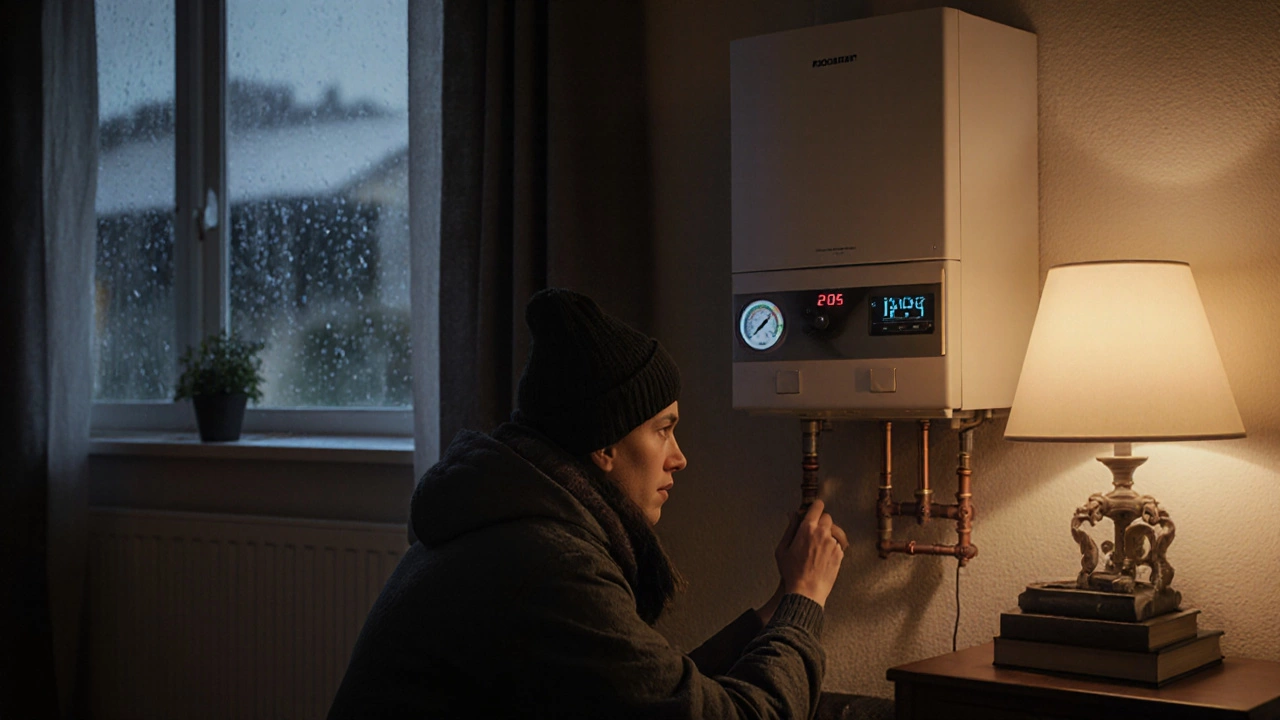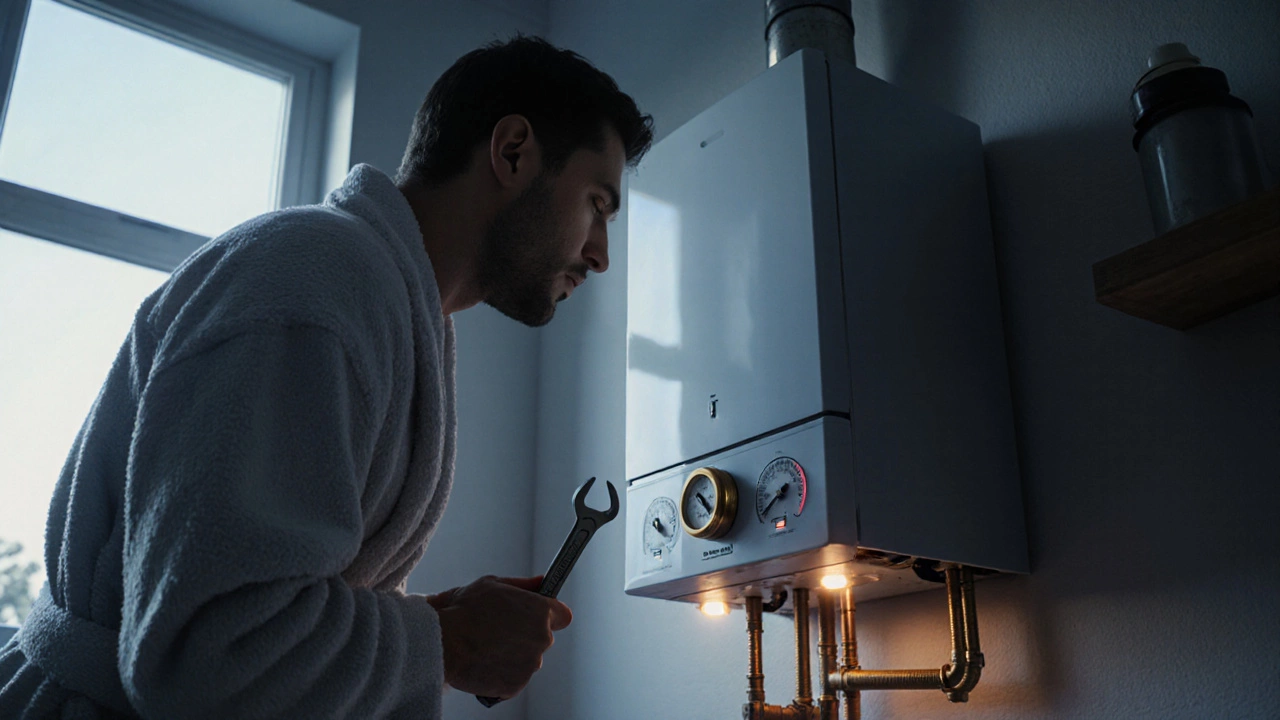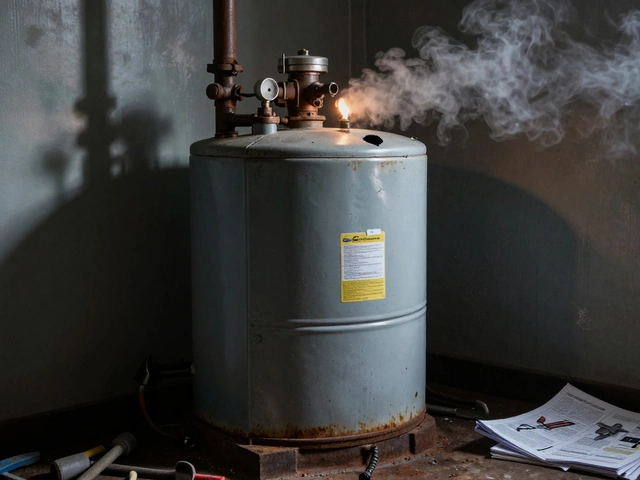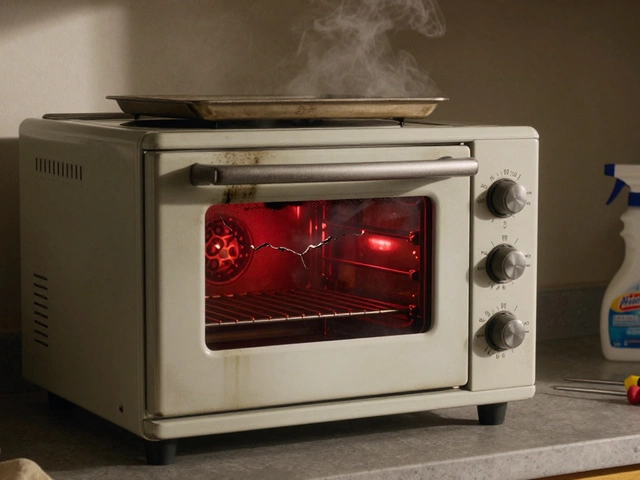You know that dreadful feeling when you wake up and your house feels like a walk-in fridge? First thought—maybe the boiler’s given up. Boilers love to throw out clues before they quit for good, but most of us miss them. So, how do you actually tell if your boiler is broken and not just sulking for a day?
You don’t need fancy tools or an engineer’s badge to spot the warning signs. Most problems show up as cold radiators, weird noises, a flashing error code, or no hot water for your shower. If you notice these, don’t ignore them hoping they’ll fix themselves—I made that mistake last winter and ended up shivering with Laura for three days while we waited for a part nobody had in stock.
Before you panic, some issues can be sorted with a couple of simple checks, like topping up the pressure or resetting the boiler. I’ll walk you through the main red flags and what you can do right now, so you don’t end up in a cold house longer than needed.
- Classic Signs Your Boiler’s on the Blink
- Weird Noises and Strange Behaviors
- Spotting Hidden Faults (Don’t Ignore These!)
- Quick Home Checks You Can Do
- When to Get Professional Help
Classic Signs Your Boiler’s on the Blink
When your boiler’s acting up, it’ll show you some pretty clear warning signs. The trick is knowing what matters and what’s just normal noise. Miss these classic signs, and you might find yourself with no heat on the coldest day of the year.
- No hot water or heating: This one’s obvious. If you’re shivering and showers run ice-cold, that’s a giant red flag your boiler broken scenario is real. It’s usually the earliest and most undeniable sign.
- Boiler keeps switching off: A healthy boiler should just do its thing. If it keeps shutting down or tripping the circuit breaker, there’s a problem lurking—could be low pressure, a dodgy sensor, or air in the system.
- Unusual boiler pressure: Every boiler has a pressure gauge, usually on the front panel. If it’s sitting below 1 bar or close to 3 bar, something’s up. Low pressure often means a leak; high pressure risks a bigger breakdown.
- Strange noises: Clicking, banging, or whistling that wasn’t there before isn’t normal. These noises can point to limescale, trapped air, or a failing pump.
- Fault lights or error codes: Most modern boilers flash up an error code when there’s trouble. Don’t ignore these. The code tells you (or the engineer) what’s wrong. Quick Google search with your boiler model and error code can pinpoint the issue.
- Pilot light keeps going out (on older models): For non-digital boilers, if the little blue flame keeps dying, something needs attention. It could be as simple as a faulty thermocouple.
Don’t just trust your senses, check the stats! According to data from the UK’s Energy Saving Trust, roughly 80% of boiler breakdowns show up as either no heat or hot water problems. Here’s a simple breakdown of the main symptoms people report before their boiler totally packs it in:
| Symptom | % of Reported Cases |
|---|---|
| No heating or hot water | 53% |
| Frequent shutdowns | 14% |
| Noise and banging | 17% |
| Error codes | 9% |
| Pilot light issues | 7% |
Spotting these early classic signs can save you hundreds on repairs and keep your home comfy. If you notice one or more of these, it’s time to look closer or get on the phone to someone who can help.
Weird Noises and Strange Behaviors
Boilers aren’t supposed to sound like a haunted house or a kettle about to burst. If you’re hearing odd noises—think banging, gurgling, or even whistling—that’s usually your first warning sign. These sounds mean something’s off inside, even if you’re still getting heat or hot water for now.
Banging or clunking often points to an issue called "kettling," which happens when limescale or sludge builds up on the heat exchanger. This makes water overheat and steam, causing those loud booms. In hard water areas, this can sneak up faster than you’d think. Gurgling usually means trapped air or low water pressure. And if your boiler starts whistling, like a distant train, it’s usually overheating or there’s a blockage.
Along with the noise, pay attention to any odd behaviors. Look for things like:
- The pilot light keeps going out for no good reason.
- Heating turns itself off without you touching anything.
- Radiators heat up unevenly or stay cold even when the boiler’s on.
- Error codes flashing on the boiler’s display (keep your user manual handy for these—sometimes it spells out the problem for you).
Boiler makers have tracked complaints and found that about 55% of breakdowns involve strange noises or random shutoffs. Ignoring these signs often leads to bigger, pricier repairs.
| Noise | Likely Cause | Action |
|---|---|---|
| Banging | Limescale or sludge buildup (Kettling) | Flush the system, call a pro |
| Gurgling | Air trapped, low water pressure | Bleed radiators, check pressure |
| Whistling | Overheating, blockage | Check thermostat/settings, call a pro if needed |
Most of the time, these “weird” symptoms are your boiler asking for help. If you catch them early, a quick fix at home could save a lot of money. But when in doubt—or if the noises get louder—don’t risk it. A proper boiler repair might be needed to keep things safe and running right. If Laura complains the boiler sounds like it’s about to take off, I know it’s time to act fast.
So, when your boiler broken signs start with weird sounds or behaviors, pay close attention. Tuning them out could lead to bigger problems down the line.
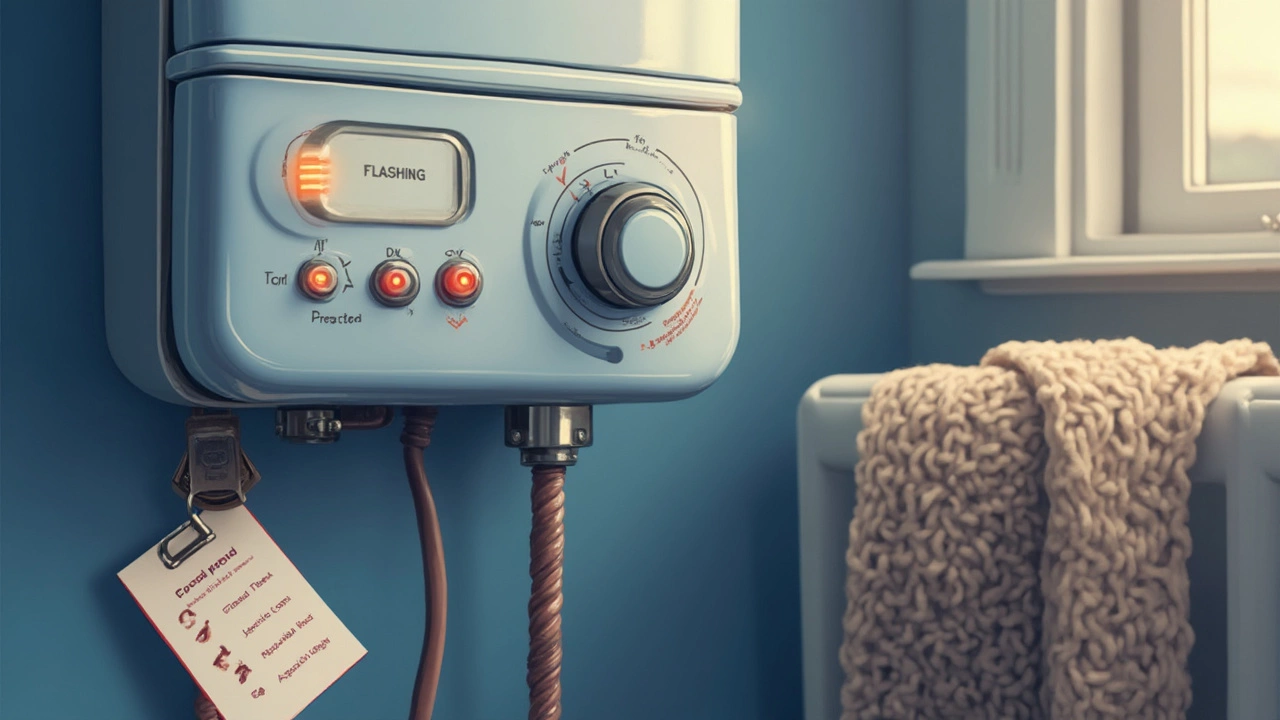
Spotting Hidden Faults (Don’t Ignore These!)
Some boiler issues don’t shout—they whisper. You won’t always get an obvious puddle or a chorus of banging pipes. Sometimes, stuff just runs off behind the scenes, slowly causing damage or knocking out your heat when you least expect it. Miss these early signs, and you might face a bigger headache down the road.
Here are some accurate red flags that often go unnoticed:
- Pressure drops that happen again and again, even after you top up the boiler—this usually means there’s a hidden leak or an internal issue.
- Strange smells near the boiler, like metallic or even eggy scents. That could hint at a gas leak or something wrong with the flue—don’t ignore it.
- Pilot light keeps turning off, or goes yellow (instead of blue) in older boilers. This isn’t normal and can even be dangerous.
- Mysterious damp patches near the boiler or pipes, especially if they keep coming back after you wipe them up.
It’s not just about what you see or hear. Sometimes you’ll just notice your bills creeping up, even though you haven’t cranked the heat. According to the Energy Saving Trust, “An inefficient boiler can use up to 30% more gas than a healthy one, leading to much higher energy costs.”
"If your boiler’s pressure keeps falling or you notice any odd smells, don’t risk it—get it checked by a professional right away." – Gas Safe Register
If you need to compare what’s normal and what’s not, here’s a quick cheat sheet:
| Symptom | What’s Normal? | Hidden Fault? |
|---|---|---|
| Boiler pressure drops | Maybe once every few months | Happens frequently or can’t keep topped up |
| Pilot light color | Blue | Yellow or flickering out |
| Energy bills | Stable, seasonal changes OK | Sudden jump not explained by usage |
| Leaks or damp | Dry and clean around boiler | Persistent damp patches, rust, or mold |
If any of those hidden symptoms sound like what’s going on at your place, don’t just cross your fingers and hope for the best. These aren’t just small annoyances—they’re your boiler broken warning lights. Quick action can save you a wallet-busting repair or worse, a safety issue.
Quick Home Checks You Can Do
Before you ring up a repair service, try these straightforward checks at home. Sometimes it’s a simple fix, and you don’t want to pay for an engineer just to flick a switch or top up water.
- Check the Pressure Gauge: Most boilers run best between 1 and 2 bars, shown on a little dial at the front. If pressure drops too low, your heating and hot water will vanish. If it’s under 1, your system might lock out. Topping up is often as easy as turning a couple of taps under the boiler until the needle hits the sweet spot.
- Look for Error Codes: Modern boilers flash error codes if something’s wrong. Grab your manual (or Google your boiler make and code) for what it means. Sometimes it’s a quick fix or reset.
- Is the Thermostat Working?
Sounds basic, but sometimes folks like me forget to check. Make sure the thermostat is turned up, the time setting is correct, and the batteries (if it’s wireless) aren’t dead.
- Pilot Light or Display Lights: If your pilot light is out or your display has gone blank, it could point to an electrical issue or—sometimes—just an accidental switch off at the mains. Double check the power supply and your fuse box.
- Bleed the Radiators:
If your radiators are cold at the top but warm at the bottom, air is probably trapped. Use a radiator key to bleed them—just don’t forget to have a cloth handy for drips.
Here’s a quick reference table you can use if your heating or hot water stops working:
| Symptom | Likely Cause | Quick Fix |
|---|---|---|
| No heating, no hot water | Low pressure, thermostat off, power cut | Check pressure, reset system, check mains |
| Radiators cold at top | Air in system | Bleed radiators |
| Boiler making new noises | Kettling (limescale), trapped air | Bleed system, call if noise persists |
| Flashing error code | Boiler detected fault | Consult manual, reset, call engineer if code stays |
Try these steps before calling a professional. If the boiler broken symptoms are still hanging around, that’s your cue for the next level: ring up a boiler expert. Don’t risk a week in the cold, especially if it’s anywhere near January.

When to Get Professional Help
Sometimes, no matter how handy you are, it's time to call in an engineer. If your boiler is leaking water, that’s a big red flag—a puddle under the unit usually means a problem with an internal valve or the heat exchanger. Both of those jobs need a qualified pro.
If you smell gas or get a whiff of something like rotten eggs, get everyone out of the house and call the gas emergency line immediately. Yes, it’s rare, but gas leaks are deadly serious and not a DIY fix. Don’t tough it out or try to find the leak yourself. Safety is way more important than saving a few pounds.
Another reason to call in a boiler repair expert? If your pilot light keeps going out even after relighting, or your thermostat doesn't talk to the boiler—it should click or make a noise when adjusting the heat—those are electronic or sensor faults that need the right training to tackle.
- Your boiler makes constant banging, whistling, or gurgling noises even after bleeding radiators or topping up pressure
- There's an error code showing on the display you can't clear by resetting
- No hot water or heating with all controls set correctly
- You've lost boiler pressure and it won't hold after topping up
- You see visible damage, like scorch marks or rust
When any of these happen, don't keep turning the system on and off. That can make things worse. A professional will have the certifications (like Gas Safe in the UK) and tools to safely diagnose and fix the problem.
And here’s a solid tip: always check reviews before booking anyone. Not all "boiler repair" experts are equal—trusted ones explain the fault, give a proper repair quote, and never suggest parts you don’t need. Protect your wallet, and your home stays safe and toasty.
If you’re unsure, it’s better to play it safe. The boiler broken moment is already stressful enough—let a pro get you back to hot showers and warm rooms, fast.
